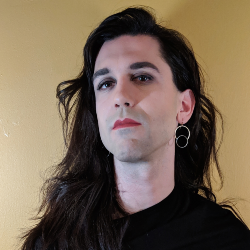After Snowdrops
Do you know what I was, how I lived?
—Louise Glück
I did not
know what
I was
I refused
to see
how I lived
I wanted
to not
know what despair
was but now
I see it has been
all
over my skin
light
rot
spots
portend
time bruise
I expected
to survive
at least until winter
meaning
snow
drops
signals natural end
my
life suppressed
now
I do
not
expect to
survive I must
wake
to this fact dry
earth
forgetting
my body
as a boy
I was
afraid yes
I was
among the unfamiliar
stalks
and grasses strange
meadow
I could
not see I was
a part
of
the expanse
I said
I refuse
was mute
my own
hand covering
melody
heard it in
the distance
my head
echoing
concrete
chutes now
as not
a boy I am
among you
a battered
garden
refusing
to release
but forced
into stasis the
harsh light
changes
it
like it changes me
makes
my hair
grow wild
stubborn
as it finds new
beauty
yes risk
yes joy
even in
this
evening
wind
raw
final
finally
new
After Matins
Unreachable
—Louise Glück
we keep ourselves
unreachable
exiled from
the heaven
on offer
in its place
replica of expansiveness
less full
of beauty
without
alternative
flesh
authors
its own
worship
nature
returns
what it
takes
only after
having
transformed
it
Artist’s Statement
These poems are taken from my manuscript After the Wild Iris, a full-length response to Louise Glück’s The Wild Iris. I love Glück’s book, but as I’ve returned to it over the years, it’s begun to feel increasingly unconnected to the world I know. For one, it’s unreservedly straight and cis. For another, it operates under the assumption that the natural world will infinitely renew itself in the yearly cycle of seasons, a prospect that feels increasingly foreign as our environment spins towards catastrophe. I began to write, searching for a form that could hold my experience of multiplicity and reflect the often fragmented experience of living in the shadow of looming climate disaster. I wanted a form that could be read in multiple ways, that could hold a variety of meanings and realities within a single poem.
Each poem can be read top to bottom and left to right, but is also broken up into separate pathways, allowing fragments to cohere into new ideas, images, and narratives. The reader must navigate through these, triangulating various threads of meaning. To me, this is where the poem lives, not in any single strand of text, but in the action of holding various fragments together into a momentary and unstable whole.

Iris McCloughan is a nonbinary trans* writer and artist in New York. They were the winner of the 2018 Stanley Kunitz Memorial Prize from American Poetry Review, and are the author of three chapbooks, including Triptych (2021, Greying Ghost) and Bones To Peaches, selected for the 2021 Robin Becker Series by Seven Kitchens Press. Their writing has appeared or is forthcoming in juked, jubilat, American Poetry Review, and ANMLY, among others.

